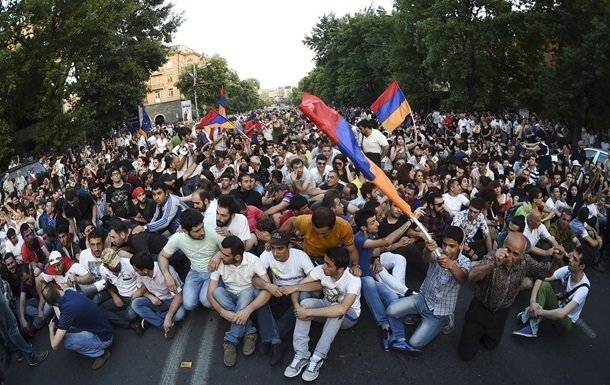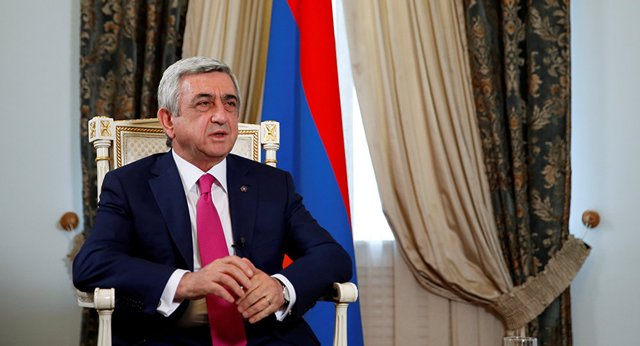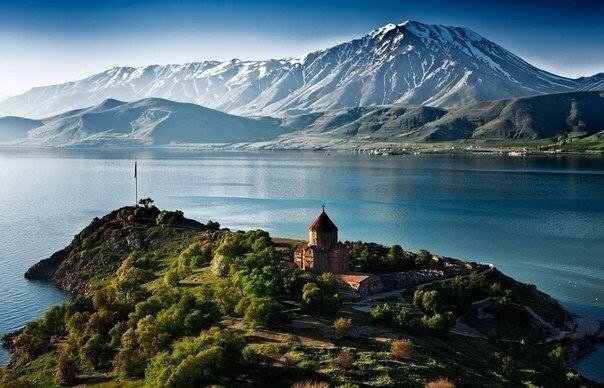Peaceful revolution in Armenia rejoices
In Armenia, the peaceful revolution won: so, in any case, its participants say. However, it is now difficult to find a person who is not involved in the events of recent days.

pic by korrespondent.net
Ex-president and former Prime Minister Serzh Sargsyan did not hold out for 6 days: today he was forced to resign under the pressure of thousands of people literally splashing out onto the street. In his statement of resignation, warm and humane, he admitted a mistake and stated that he could not resort to "other" options for denouement.
Why Serzh Sargsyan could not use force?
By "other" variants was meant power overclocking, which was used more than once in Armenia. In terms of the number of policemen per capita, Armenia ranks second in the world, and, along with other security structures, the police were quite able to disperse the people, especially when the number of demonstrators has not yet reached a critical point. However, according to unofficial data, 160 thousand people gathered on the Republic Square in Yerevan on April 22. For the 3 million population of the republic this is a significant figure.
Something prevented the use of force. Serzh Sargsyan wrote in his statement: "... it's not for me" - and he would never have done it. However, there are other "constraining" factors. In particular, on November 24, 2017, Serzh Sargsyan signed the Agreement on Framework and Comprehensive Cooperation with the European Union in Brussels. This agreement categorically warns against the use of force in the dispersal of peaceful demonstrations.

pic by foreignbrief.com
When Serzh Sargsyan was president (2008 - 2018), Armenia's foreign debt grew from $ 1.9 billion to $ 7 billion (while the country's state budget does not reach $ 4 billion). Armenia mainly owes the World Bank and the International Monetary Fund. It is no accident that immediately after the election of Serzh Sargsyan as prime minister on April 17, Deputy Prime Minister Vache Gabrielyan was sent to Washington, who met with representatives of the IMF, the World Bank, the State Department, the Treasury and discussed prospects for economic cooperation with them. All of them warned Armenia against using force and promised nothing.
Thus, Serzh Sargsyan's hands were primarily connected with international obligations.
Serzh Sargsyan did not have any support within Armenia either
In 2015, when announcing the constitutional reforms, according to which Armenia moved from presidential to parliamentary form of government, Serzh Sargsyan stated publicly that in the event of a constitutional amendment he would not claim either a president (with truncated powers) or a prime minister (with super powers). Then this statement was perceived as a guarantee that the constitutional reforms are not covered by Serge Sargsyan himself, but are made for the good of the country.
However, with the approach of the end of Sargsyan's presidential term on April 9 this year it became obvious that he intends to run for prime ministers. It was also obvious that even part of his own party, the ruling Republican Party of Armenia, did not support him in this.
The Armenian society did not forgive Serzh Sargsyan for deception, and this opposition was saddled by the opposition leader, the deputy from the Elk block ("Exit") Nikol Pashinyan, who put forward only one condition - the resignation of Serzh Sargsyan.
It was a big response, perhaps unexpected for Nikol Pashinyan himself, to its manifestations joined by students, youth, and on the last day - military and government officials. Unexpectedly it turned out that Serzh Sargsyan is unacceptable for the majority of the population.
Manifestos in Armenia
The revolution was absolutely peaceful - there are no dead, seriously wounded, there are no destructions, no pogroms. Everything was so peaceful that a 50-thousand-march procession would bypass the lawns so as not to trample down the flowers.
In Armenia there will be no monument to the victims of the April revolution, and Armenians thanked not only the demonstrators, organizers, who constantly called for not resorting to violence. The people are also grateful to the police, which, despite a number of operations and detentions, acted "strongly but cautiously" without harming anyone.
What will happen after the revolution?
On April 23, when it became obvious that the protests were gaining momentum, when the strike was announced by all five universities of Armenia, the authorities began to prepare for resignation - as the most painless outcome. President Sargsyan had a meeting with the participation of the country's top leadership and the president of Karabakh, after which First Deputy Prime Minister Karen Karapetyan stated that he asked the prosecutor's office to withdraw the petition for the arrest of Nikol Pashinyan and that he intends to meet with him.
The decision on the resignation was made, and Karen Karapetyan personally deduced Nikol Pashinyan from custody (Pashinyan was detained on April 22).
Serzh Sargsyan resigned, then an emergency meeting of the government took place, at which it was announced that the prime minister's powers would transfer to Karen Karapetyan. Within 7 days, the Republican Party of Armenia will have to nominate a new candidate for prime ministers.

pic by adventurous-travels.com
Well, despite the "negativity" of the revolution as a whole. It should be remembered that society can still dictate its demands. This once again proves that a sharp change of power or a change in the state system can be without sacrifice and bloodshed.